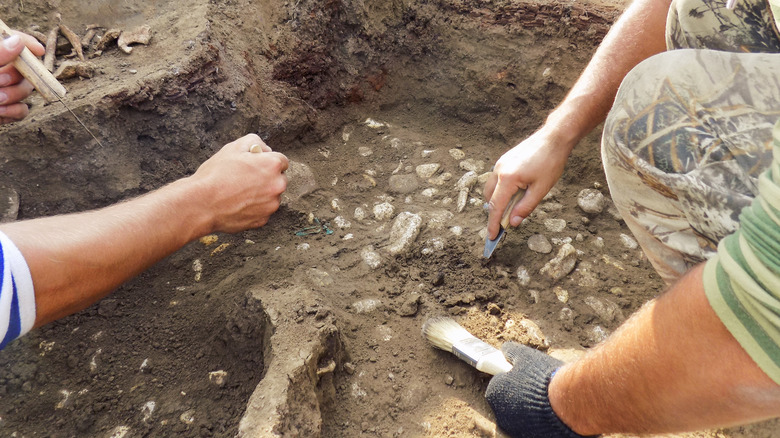Scientists Have Found What Could Be The Earliest Evidence Of Cooking
What compelled the earliest humans to cook their food? And what does cooked food tell us about the past and, more importantly, about human development?
These questions are what researchers of human origins have been asking for years. The importance of eating cooked food goes beyond nutrition. An article by CNN explains that cooking food meant that early humans, who once would have to expend a great deal of their time and energy searching for fresh food, could now "develop new social and behavioral systems." For early humans, the discovery of fire artificially extended the day, created a place for social gatherings, and offered heat and protection. And when applied to cooking, a fire helped with the safe consumption and storage of food.
Dr. Bethan Linscott at the University of Oxford told CNN that understanding when humans first began cooking food helps us understand why evolution progressed as it did. Cooked food offered early humans a reliable food source, which is most likely what enabled them to migrate, according to John McNabb, a professor at the Centre for the Archaeology of Human Origins at the University of Southampton. So, when exactly did humans first begin cooking their food?
Humans were cooking 780 thousand years ago
According to a new study published by the journal Nature and Ecology and Evolution, evidence of cooking was found to have occurred as early as 780 thousand years ago. According to a PubMed article, this is a considerable change in the timeline, where the earliest evidence of cooking was believed to be 170 thousand years ago.
The newest research found fish teeth at the edge of the ancient Lake Hula in Israel at the Gesher Benot Ya'aqov, and the site revealed that the earliest humans, Homo erectus, were cooking there. The fish teeth were analyzed by a team led by Dr. Irit Zohar, a researcher at Tel Aviv University's Steinhardt Museum of Natural History, according to CNN.
But how do we know that the fish teeth weren't just discarded in the fire or that fish was cooked instead of eaten raw? The analysis of the teeth revealed a change in the tooth enamel — the type of change that occurs when exposed to changes in temperature. Even more specifically, scientists were able to determine that the fish was cooked at temperatures of 392 and 932 degrees Fahrenheit, according to CNN. This particular temperature range reveals that "they were not cooked directly in fire and were not thrown into a fire as waste or as material for burning," according to Dr. Jens Najorka, an x-ray lab manager at the Natural History Museum in London, who was part of the study.
Eating meat contributed to brain size
Further analysis of the teeth also revealed that fish were a regular part of the Homo erectus diet. Fish consumption by these lake dwellers was not seasonal, or a rare treat. According to the team of researchers at the Gesher Benot Ya'aqov site, the geochemical composition of the tooth enamel reveals the season in which the fish died, and the researchers found that they were eaten year-round. This regular access to protein is believed to have contributed to the increase in brain size in the earliest humans, as told to CNN.
While human remains were not found at the site, there were stone tools that matched those used by Homo erectus found across South Africa, according to Dr. Zohar (who has worked at the site for over 16 years) in a CNN interview.
"This is an incredibly important discovery," archaeological geochemist Dr. Bethan Linscott told CNN. She was not involved in the study but believes that "this will have a wide impact on the research community."


